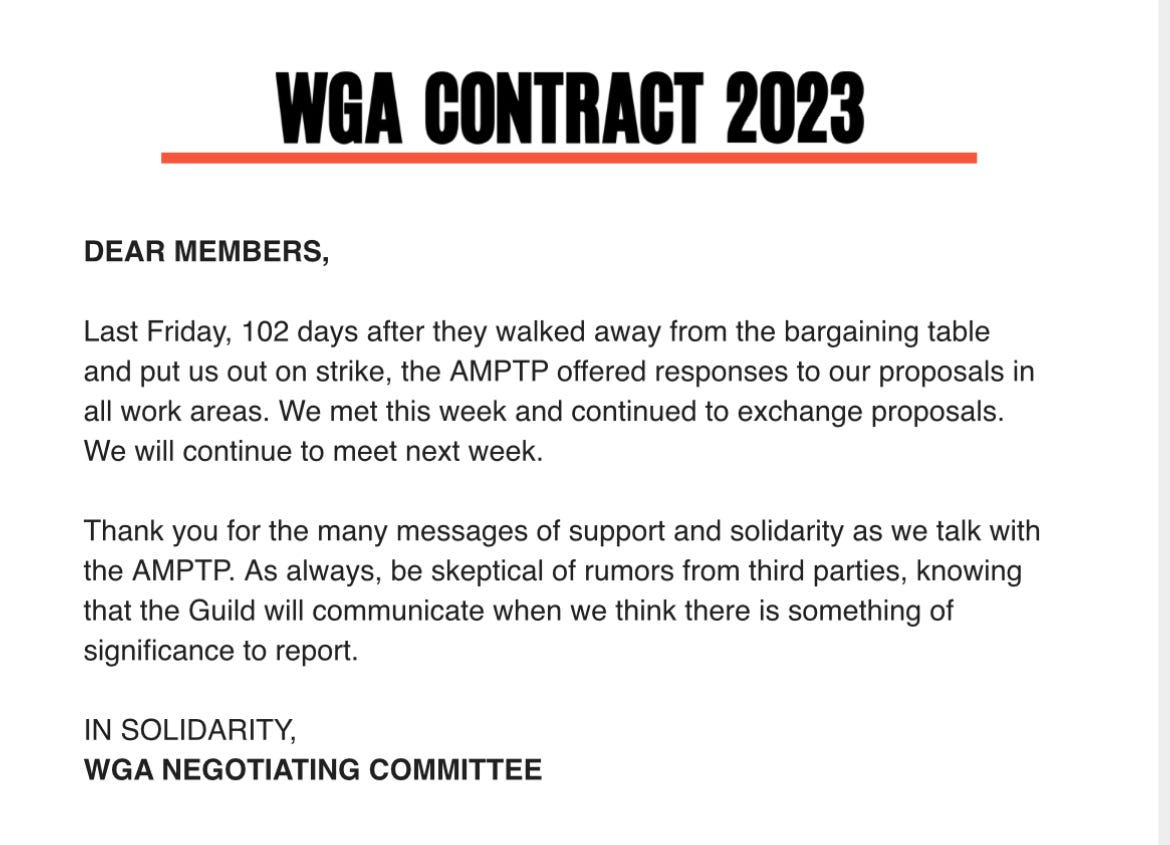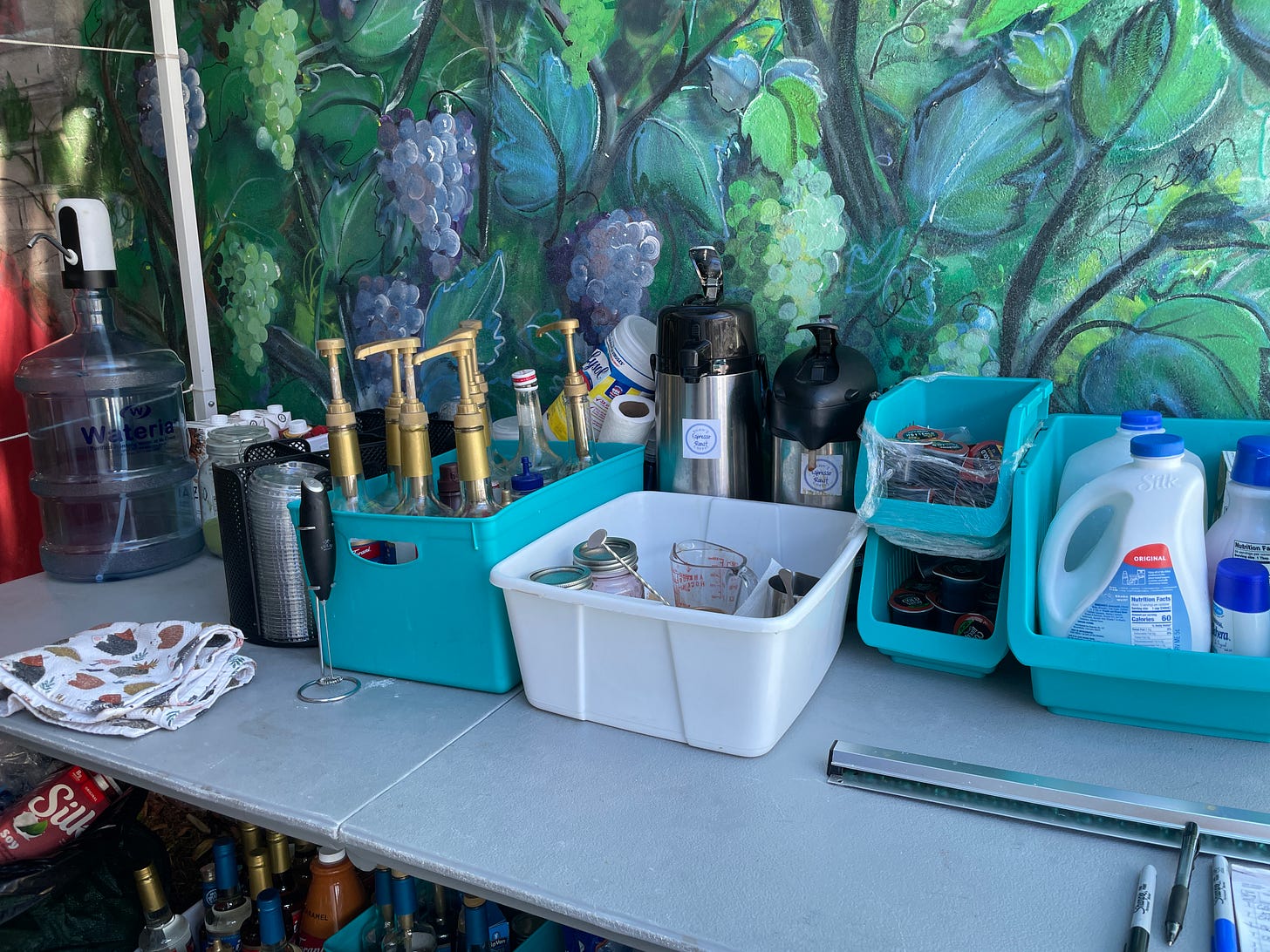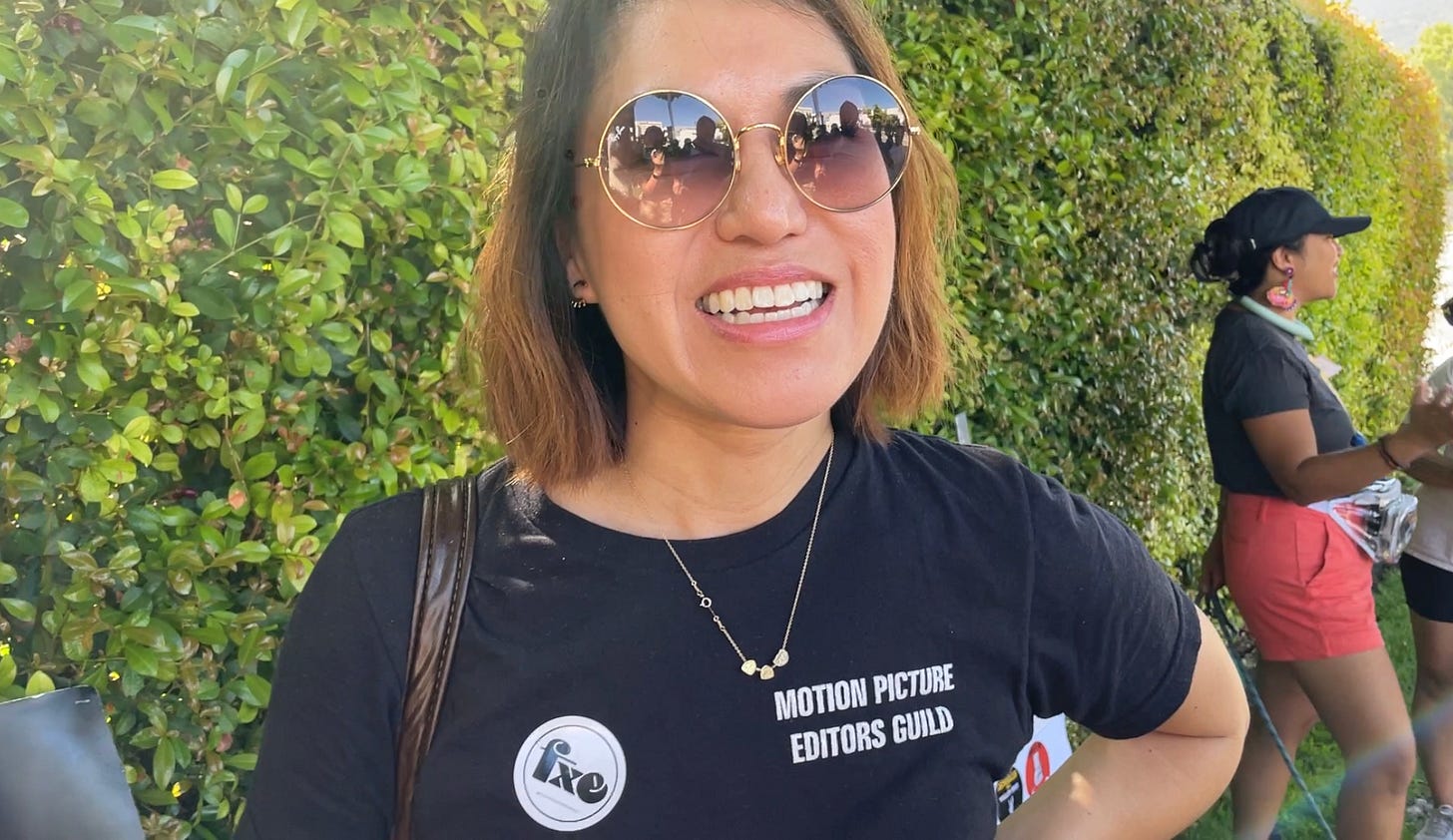The Strike Businesses Providing Picket Fuel This Summer
➕ The writers union and studios plan to meet again this upcoming week
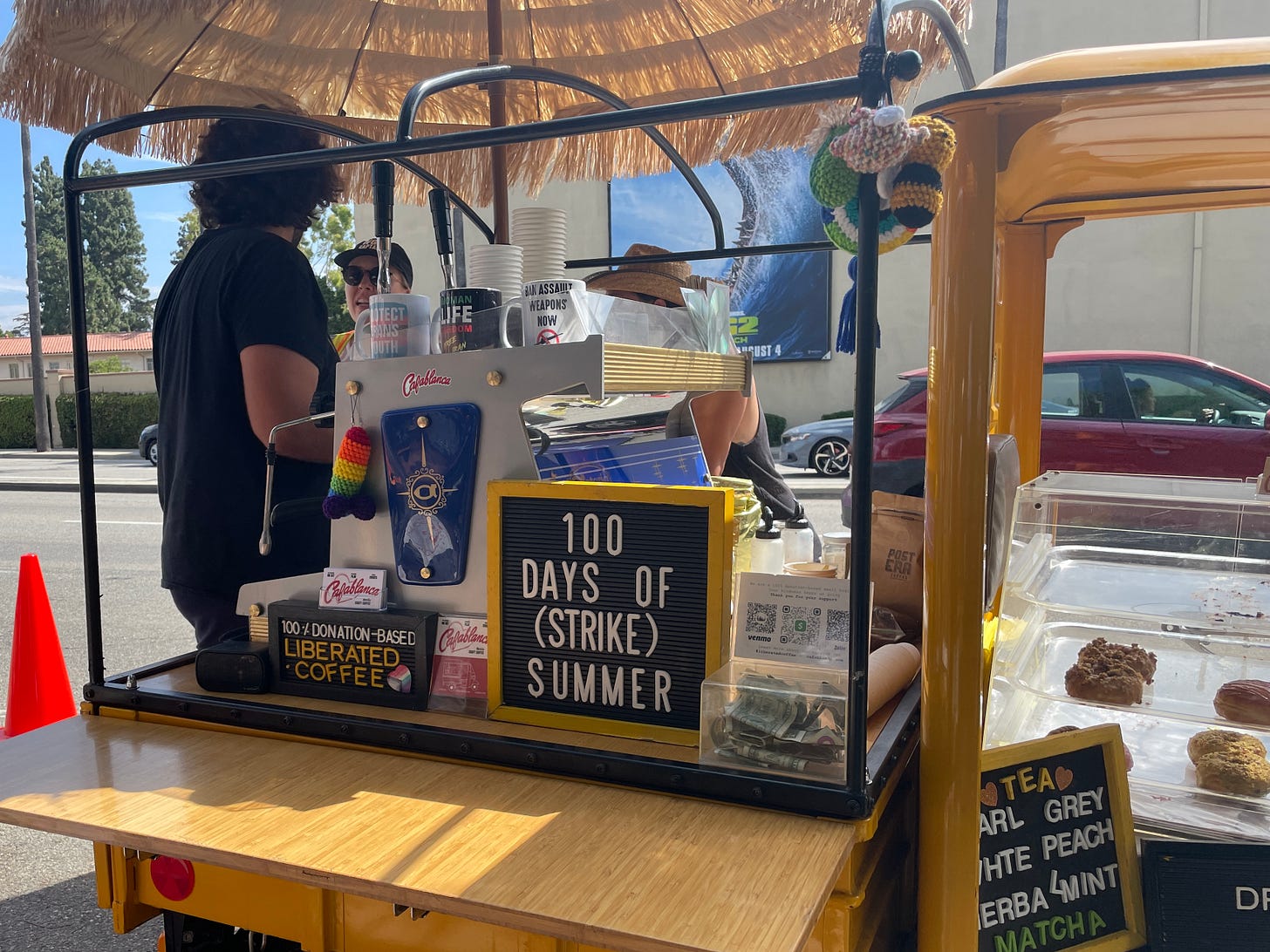
Weekend edition of Strikegeist here. We’ll get to the fun stuff: a long read on businesses that have emerged during the strike. But first, here’s the latest on contract talks between the Writers Guild of America and the Alliance of Motion Picture and Television Producers.
Both parties met for four straight days this week, culminating in the following update from the WGA to its 11,500 members on Friday night: “We met this week and continued to exchange proposals. We will continue to meet next week.”
So: no deal just yet, but progress is being made. Remains to be seen where they’ll land on the sticky issues of AI, streaming residuals, wage increases, mini rooms and staffing minimums (and hoo boy, hasn’t that last one been the talk of the town this week), but it sounds as though negotiations have been properly revived after 100-plus days of the writers strike.
As of Sunday, we’re on Day 111 of the WGA strike and Day 38 of the SAG-AFTRA strike.
Oh, and all WGA and SAG-AFTRA pickets in Los Angeles have been canceled for Monday on account of Hurricane Hilary, a sentence I never thought I would utter. Stay safe and dry, everyone.
Feeding a Fever: Dean’s Coffee, LA Lumpia Lady, Cafablanca
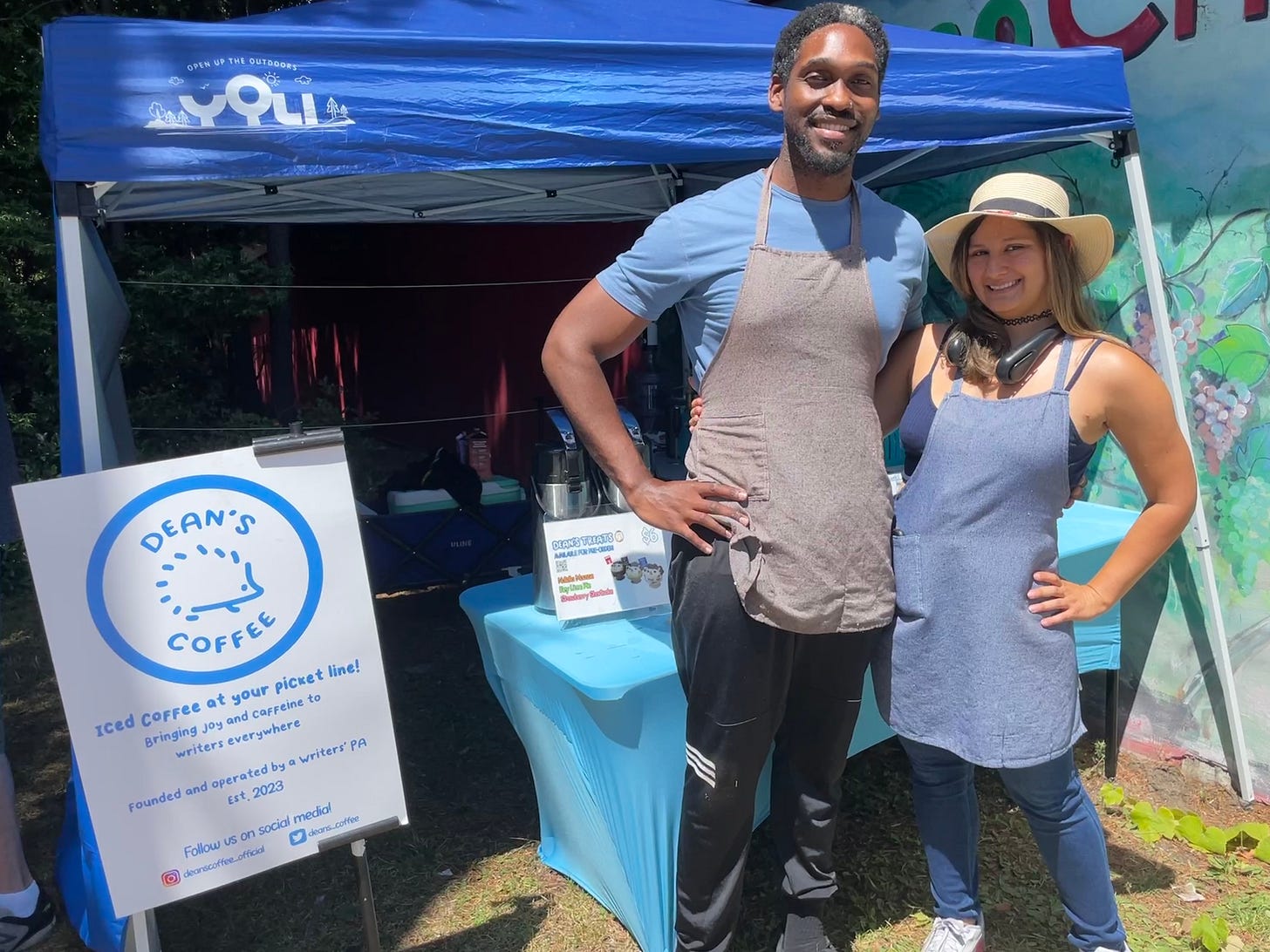
The writers strike had been raging for a couple of weeks by mid-May when writers production assistant Andrea Alba-von Buren, 28, found herself at a loss. She hadn’t worked in a TV writers room since January, and job applications elsewhere seemed to going into a black hole.
“I was not doing well,” she tells me one morning in early August outside the Warner Bros. lot. “I was kind of struggling a little bit mentally, and I was really worried financially, because obviously, we all live in L.A. — my rent had been increased just a couple of months before. And unemployment can only go so far.”
One day at home, she turned to her friend and roommate, Olivier Alerte, a production coordinator whose work on awards shows and live events had also gone dark during the strike. “Wouldn’t it be cool if someone sold iced coffee at the picket lines?” she asked him. He ran with the idea, and soon enough they had an outline of a business plan and somewhere between $1,000 and $1,500 in capital, all out of their own pockets. Neither had previous experience as baristas; TikTok and YouTube offered them a crash course on making caffeinated drinks for what would soon become Dean’s Coffee.
“We didn't know if there was going to be a profit at all,” says Alerte, 32. “So it's like, all right, we're gonna do this. We're committed. We're taking this seriously. If we don't make a profit, at least let's break even and pay off the credit cards.”
Alba von-Buren and Alerte are part of a wave of strike-fueled businesses that have popped up over the last few months as entertainment industry workers turn side hustles into main hustles and find ways to bring in income, all while supporting the ongoing double actors-writers strike.
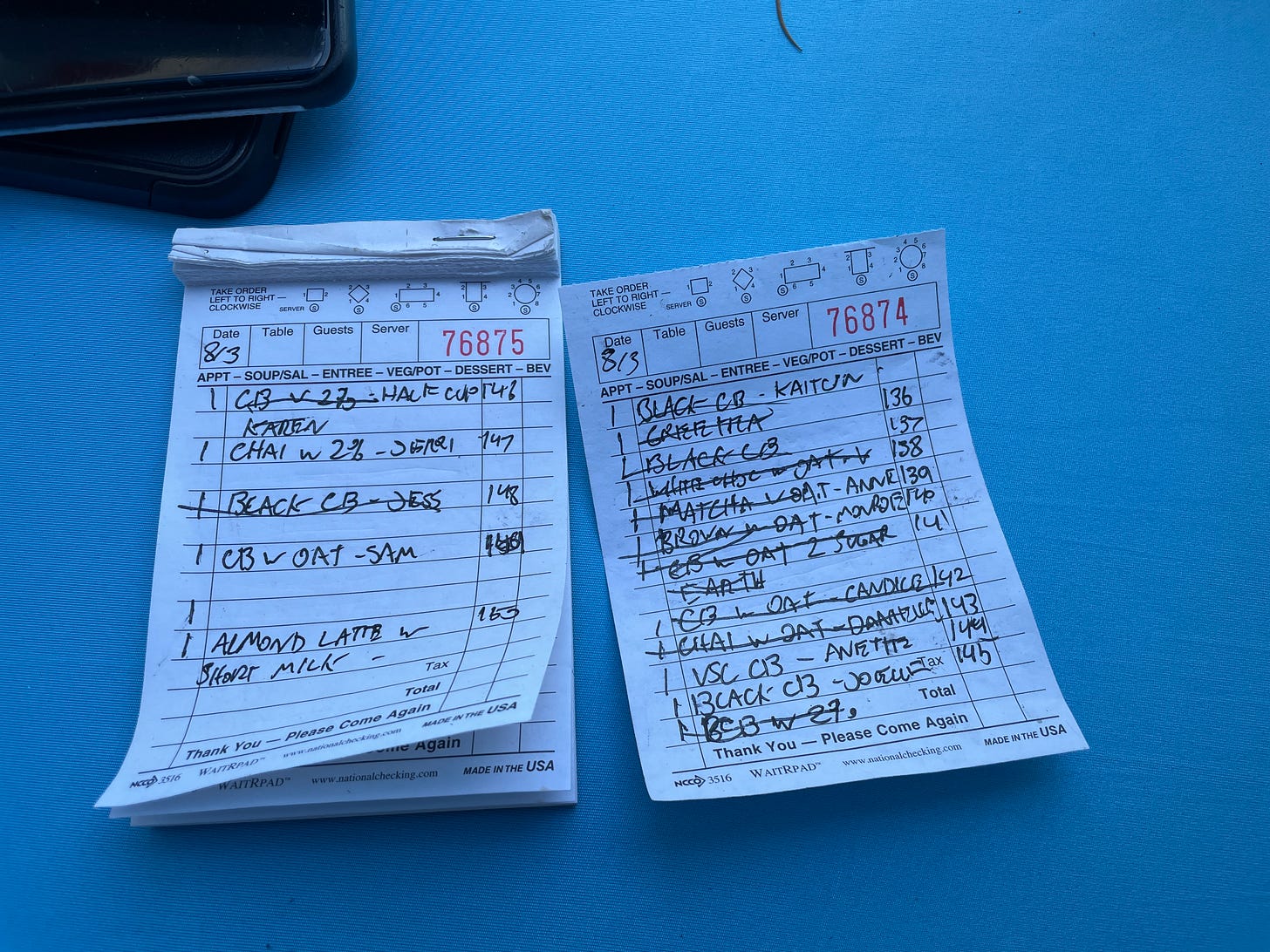
The first Dean’s Coffee pop-up appeared on a Thursday at Netflix, featuring a menu of 11 iced drinks. (Selling hot drinks require a permit in California; iced drinks only require food handling certification, which they acquired.) Sales started off slowly until Alba-von Buren’s former boss at Gotham Knights, showrunner James Stoteraux, sent her $400 to sponsor a giveaway of 100 cups of coffee on the lines.
“It feels better to me to give away coffee for free if I can than charging people for it,” says Alba-von Buren. Early sponsors included Logan screenwriter Michael Green; more recent sponsors include Criminal Minds’ Teresa Huang, Sweet Magnolia’s Sara Jumel and Roswell, New Mexico creator Carina Mackenzie. The menu has grown to about 20 items, including hazelnut lattes and cookies ‘n’ cream macchiatos.
Now almost all of their pop-ups are sponsored by picketing writers, and the pair are doing gangbusters — at least so it seems, watching Alba-von Buren and Alerta outside various studios on any given day. At the strike line outside Warner Bros., our chat is interrupted every three or four minutes by thirsty picketers looking for a boost. The new coffee-making duo make up to 50 percent profit, or about $1,000 a week after they pay off their business expenses, which include cups and syrups and milk, so much milk.
“The fridge [at home] is no longer our fridge. Just the dairy fridge,” says Alba-von Buren. “Just full of milk and full of supplies for the pickets.”
For IATSE Local 700 member and TV/film editor Crystal Leong, her pandemic business making lumpia, aka Filipino spring rolls, turned into a strike business.
Leong — who goes by Crees, or more recently, LA Lumpia Lady — is at the Buena Vista gate of the Disney lot on the day we speak, having quickly offloaded all of the lumpia she made within the first half hour of the day at a Filipinx in Entertainment event.
Like other strike allies who work in the industry, she’s on the lines to support the writers and actors negotiating for improved wages and residuals, as well as protections from AI, in their next three-year contracts.
“Those are also things that will come up and have come up in our contract negotiations, which will happen next year,” she says of her own guild, which is part of group of 13 West Coast IATSE locals that nearly went on strike in 2021.
Editors are assumed to be on-call at all times, says Leong, who often works 14- to 16-hour days during the first season of a show. She’s hoping the next contract talks combat “the expectancy to be behind the desk and be at the ready whenever a producer wants to waltz into the room.”
Business has been a little slow for now, but she’s hoping it will pick up soon to “supplement that unemployment check.”
Then there are the businesses that did not spring up during the Hollywood strikes but feel allied with their overall mission. Cafablanca’s little yellow motorized coffee car, with its menu board that recently read “100 DAYS OF (STRIKE) SUMMER” and “WORKERS EVERYWHERE UNITED,” shows up at demonstrations, pickets and voter registration drives all over the city.
“The fight that the writers and actors are fighting right now applies to every industry,” says Cameron Kude, who initially launched Cafablanca in January of 2020, right before the pandemic shut everything down. “Corporate greed affects everyone from baristas to celebrities, and that’s why we’re out here.”
The coffee cart has industry ties, catering to production crews and even making a cameo in The L Word: Generation Q. The Our Flag Means Death writers’ group Our Flag Means Strike sponsored Cafablanca to stop by Warner Bros. on the 100-day anniversary of the writers strike. The business is entirely fueled by donations.
“We’ve never charged anyone for a drink,” says Kude. “We’ve run on community support, human kindness and we just passed our three-year anniversary of doing liberated coffee.”
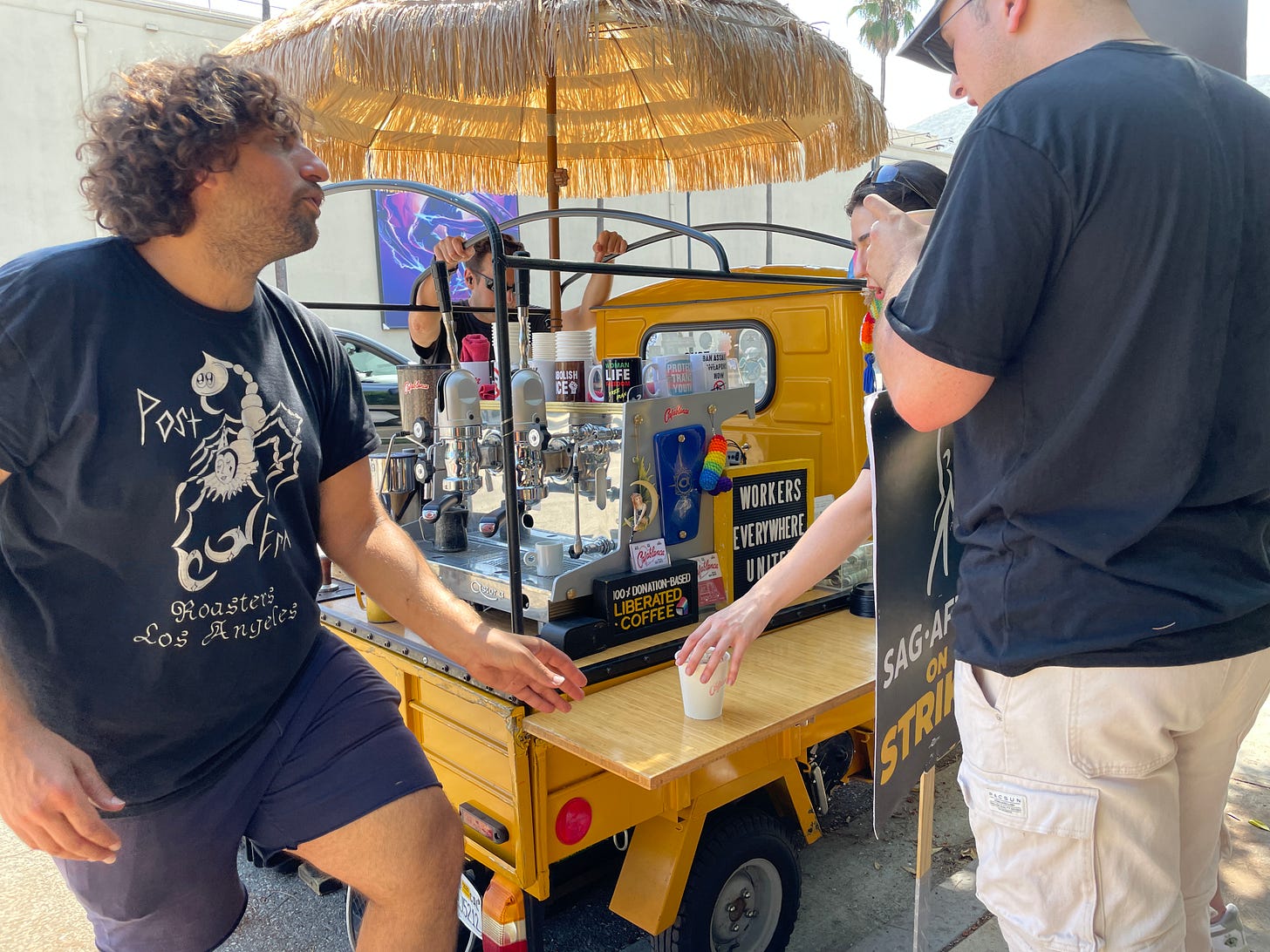
As the strikes grind on through the end of summer, startups like Dean’s Coffee continue to show up at pickets from Disney to Paramount. But for Alba-von Buren, once it ends, the plan is to eventually focus on her primary dream: getting staffed as a TV writer.
“We have talked about it being a side hustle that we can do” at special industry events, she says. “I have given [Alerte] and my mom, who seems very interested, any permission to make this into something bigger than it is. I personally want to be involved but not run it. Because I want to go back to writers room and hopefully join the WGA.”
“Of course,” says Alerte, “Any future strikes — we will be back.”
ICYMI: Strike News
Based on a poll conducted by progressive polling firm Data for Progress, approximately 67 percent of Americans support the writers and actors strikes, while 18 percent are against the labor halt. (Forbes)
Studio insiders warn that starless publicity campaigns are already causing certain theatrical releases’ revenue to fall by as much as 15 percent. “Not having stars to do publicity for your movies is a huge detriment to the overall campaign,” says one top marketing exec. “You lose the cultural impact of having talent talk about the film. Some movies wouldn’t have worked anyway, but they had more of a shot.” (The Hollywood Reporter)
The timing of the strikes couldn’t have been worse for the state of Texas, whose legislature recently approved $200 million in funding for the Texas Moving Image Industry Incentive Program, nearly five times what it received in 2021. “It was unbelievably bad timing,” says Steve Belsky, founder and former president of Local 484, the Texas and Oklahoma chapter representing studio mechanics for IATSE. “We have all of this candy in our bag, and no one can taste it yet with major productions halted.” (Texas Standard)
With the actors of Blue Beetle unable to promote the superhero blockbuster, director Ángel Manuel Soto has taken some creative measures to make sure his cast still sees the limelight, holding a picture of the film’s star Xolo Maridueña over his face on the red carpet and wearing a shirt with his film’s cast during interviews. “You realize if it was for something banal, for something stupid, then I will get mad,” Soto says. “But the truth is that our writers and actors are fighting for something 100 percent legit, and they are in the right side of history. And sure, the timing was off, why didn’t it happen a month later so that we can have our moment? But at the same time, I’m like, ‘If it happened today, it’s because it had to happen today.’” (AP)
Additional reporting for Today in Strike News by Matthew Frank.
Disclosure: Elaine Low is an inactive SAG-AFTRA member.





